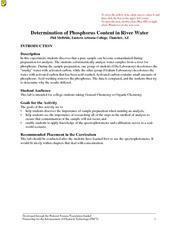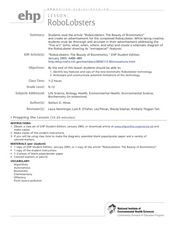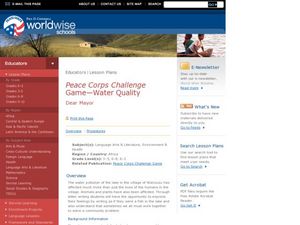Safe Drinking Water Foundation
I Want to Be an Engineer
Environmentalists turn into engineers! Your class explores the perspectives of an engineer and water keeper, including the necessary steps that are taken in order to build a water treatment facility.
Safe Drinking Water Foundation
Making a Difference
After learning about the effects of water pollution, your class will discuss ways to make people in their community aware of the importance of water conservation. Then, your young environmentalists will write a letter to the local...
Safe Drinking Water Foundation
To Filter or Not to Filter
Drinking clean water can be taken for granted. Explore the process and high cost of filtering water with a water pollution and filtration activity. Young scientist build a filtration system to filter polluted water, examine the economics...
San Francisco Public Utilities Commission
Pesky Plastics: The Problem with Plastic
What can happen to the environment if plastic continues to pollute it? Learners read about the implications of plastic on health, water, and nature in a two-page reading passage. After they finish reading, they work on six comprehension...
San Francisco Public Utilities Commission
Let's Save Water: Water Conservation
Did you know that cutting down your shower by one minute a day can save five gallons of water? Learn about water conservation with a science reading activity. After kids finish reading key terms and water-saving tips in a reading...
NOAA
Seafood and Human Health
Whether your young biologists realize it or not, humans play a significant role in marine ecosystems. To help them understand this fact children first create graphical representations that show homo sapiens' place in marine food chains,...
Rivanna Regional Stormwater Education Partnership
Invisible Passengers
How does water pollution affect the organisms living in the water? Use three science experiments to examine how erosion and other pollutants can affect water quality. Each experiment focuses on a different aspect of pollution and...
Curated OER
Water Pollution
Here is a fine lesson for fifth graders that will give them an idea of the variety of impacts that human-introduced pollutants have on the environment. After an initial class discussion and teacher-led demonstration, pupils brainstorm...
Curated OER
Determination of Phosphorus Content in River Water
Divide your chemistry or environmental science class into two groups. Each group tests water samples from a river for the concentration of phosphorus using a different method. With chemists, you can use this activity as they learn to use...
Curated OER
The Influence of Human Activity on the Environment
The surge in human population in the last 2,000 years, due in large part to better health care, has brought a surge in the demand for resources and in pollution. The graphics, photographs, and real-life examples in a thought-provoking...
Curated OER
Robo-Lobster
Introduce environmental science or engineering explorers to different forms of sampling. They read an article about "Robo-lobsters," lobsters being studied to help design robots that can used to sniff out pollution in ocean waters. The...
Curated OER
Lithosphere and Groundwater
Focusing on the quality of our water sources, these slides are full of information about the aspects of our soil and groundwater that may affect pollution. The leaching of pollutants and their impact on health is explained. ...
Curated OER
Peace Corps Challenge Game- Water Quality
Students advocate for clean water. In this water pollution lesson, students play the Peace Corps Challenge Game, discuss the effects of polluted water and write a letter to the mayor of Wanzuzu highlighting the situation of the fish's...
Curated OER
Drinking Water and Water Purification
Sixth graders design experiments to compare the amount of bacteria in river water to the amount in purified tap water. They explore how water purification removes bacteria and pollution from the water. Students examine the steps of the...
Curated OER
What Does Earth Day Mean? - Biology Teaching Thesis
Young scholars possible sources of water pollution, and explain the effects that water pollution can have on the food on the food chain. They Name human and other animal (i.e. fish) illnesses that can be contracted from drinking polluted...
Curated OER
The Wonders of Water - Biology Teaching Thesis
Students name 3-5 aesthetic values of the Potomac River. They state the importance of water in their own words. Students describe what Earth Day is and why it is important. They list 5-7 ways that they can help minimize water pollution.
Curated OER
Pollution
Young ecologists investigate some of the many ways that human activities adversely affect the environment. After identifying the main types of pollution (air, water, soil), 3rd graders fill in a Venn Diagram by pasting cut-out pictures...
Curated OER
Wheeling and Dealing NPS Wheel
A collection of three worksheets create a "Wheeling and Dealing NPS Wheel" when properly cut out and fastened together, This activity would be perfect when used with any study of how our water sources get polluted.
Curated OER
The East Fork Project
Students identify possible sources of health risks, types of exposures, routes of exposure, and populations that could be affected after discussing water pollution and environmental health hazards. After discussion, students conduct a...
Kenan Fellows
Designing a Water Treatment Plant
How does dirty water get clean enough to drink? After viewing a PowerPoint that outlines the process water goes through at a water treatment plant, groups work together to design a chlorination chamber for a treatment plant.
San Francisco Public Utilities Commission
Recycled Water: A Smart Way to Reuse Water
Learn about wastewater and recycled water with a science reading activity. After learners finish a two-page passage about conserving the water supply, they answer six comprehension questions about what they have read.
San Francisco Public Utilities Commission
What is Drought? No Rain, No Water
How can climate change affect our water supply? Have kids read a passage about the water cycle and water conservation, which includes six questions that challenge them to use context clues.
Curated OER
Three is a Toxic Number
Future public health advocates read a case study of a combination of water pollutants that may be linked to autism. The class is split into three groups, one to research each of the suspected chemicals. The look at how each one affects...
Curated OER
Who Polluted the River?
Study the impact of water pollution. A hands-on experiment and an interactive story about water pollution are the basis for the learning experience.

























